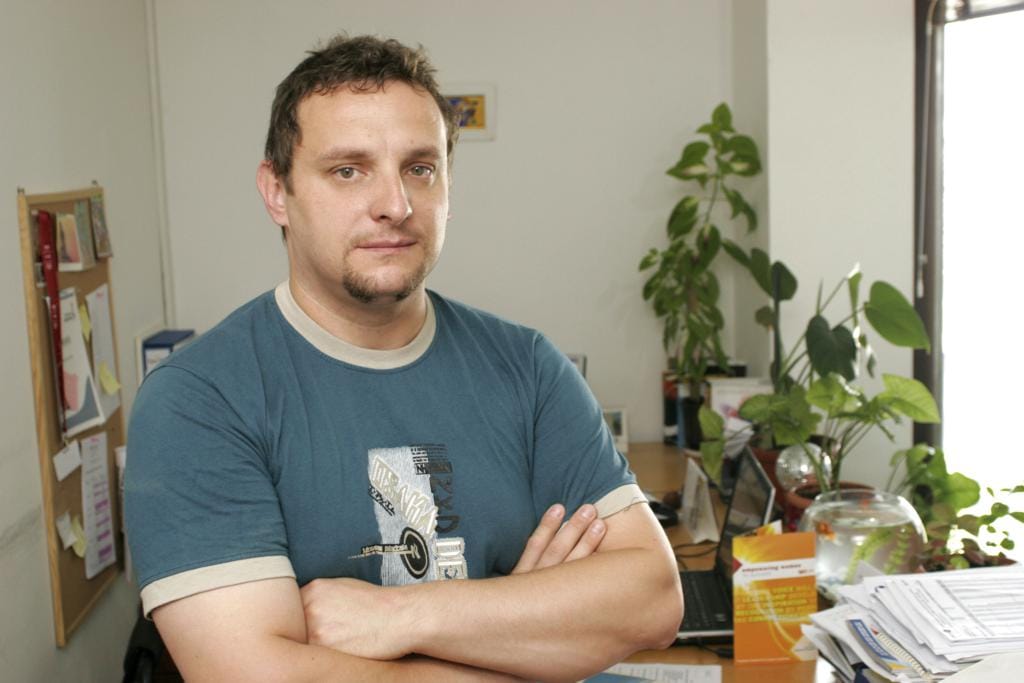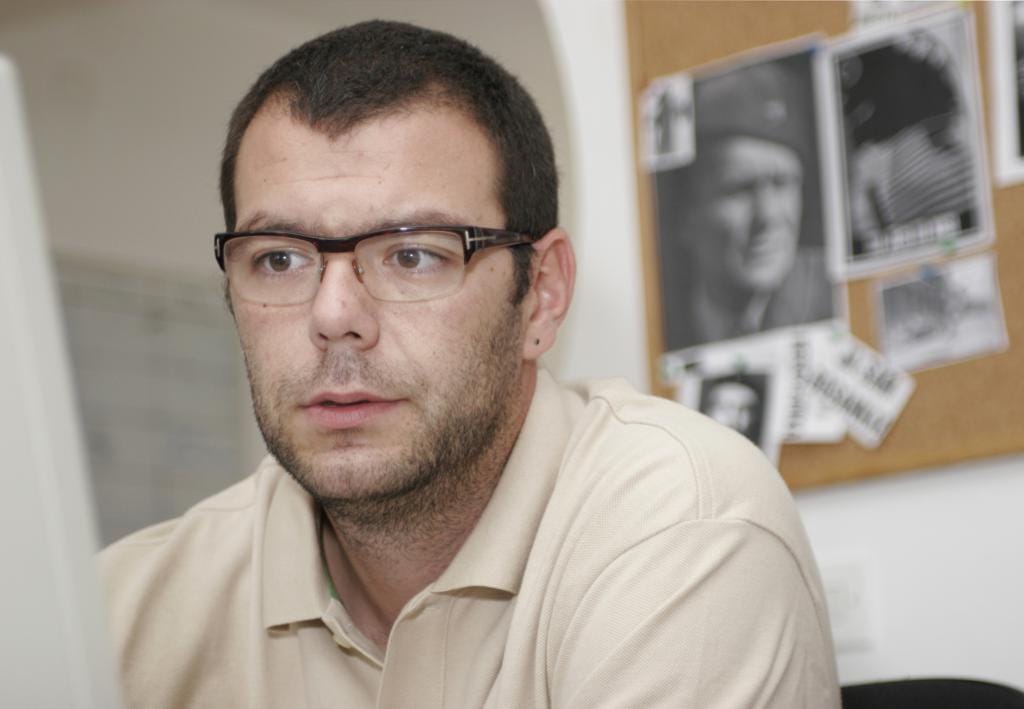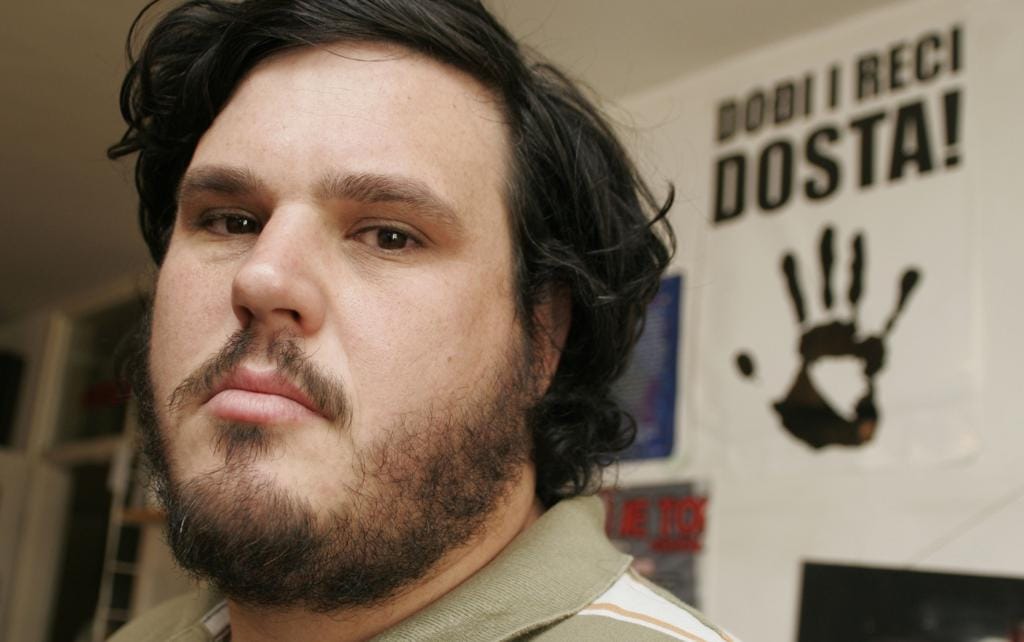Sarajevans trying to drive or ride trams home were blocked by a crowd near Čengić Vila in mid-August, demonstrating their outrage about the murder of a 23-year-old bar owner. ‘Amar, forever in our hearts’ read their signs.
The shot to the head that killed Amar Mistrić had crystallized public attention on a range of problems from unchecked crime, an inefficient judicial system and too few prison cells, to the inadequacies of authorities to deal with young delinquents. The blockade over a weekend was the latest sign of an interesting new dynamic between citizens and civil societal groups including the media on one side, and the government on the other.
Calls that something be done – anything from hiring more police and firing the Sarajevo Cantonal prime minister to organizing a paramilitary– have been loud enough to get responses from public officials who are normally indifferent to voters. They have at least promised reform and fast arrests in murder cases.
Just in February 2008, cantonal officials shrugged off citizen demonstrations over the daylight killing of a teenager at a city tram stop – and their parties were voted out in the October election.
Citizen power is growing and civic action groups, as well as smart politicians, are paying attention.
Listen to the People
While some Westerners working in Bosnia and Herzegovina (BiH) seem to think that they brought the tradition of civic activism to a country that was communist for decades and then politically destroyed in a bitter war, the notion is hardly a new one in BiH.
Under Communism, Yugoslavia had labor organizations, worker councils, and apartment co-ops that all taught this lesson: people at the bottom have the right to voice their opinion and get a response.
Political scientist Ismet Sejfija, in his 2008 PhD dissertation traces modern and independent civic activism to 1989 when interest groups developed under the socialist self-management system.
The Balkans war of the 1990s brought in a flood of primarily faith-based humanitarian organizations. After the war ended, more groups came with the aim of protecting human rights and promoting democracy.
The Center for the Promotion of Civil Society (CPCD), for example, was established in Sarajevo in 1996 by members of the Academy of Arts and Sciences and citizens who wanted to see an open democratic society of well-informed, active citizens.

‘According to estimates, between 8- and 10,000 nongovernmental organizations operate in BiH. There are about 20,000 in Croatia’ said Ševko Bajić, CPCD’s public relations manager.
There are so many, he said, that citizens became suspicious of civil society organizations saying: ‘Foreigners favor them and all they ever do is talk.’
He said, ‘In developed countries, it is normal for people to establish associations even if it’s only five fishermen whose common interest is the preservation of one type of fish.’
Although NGO is a well established as a term for civic action organizations, Bajić prefers term civil society organizations, which includes NGOs but also other formal and informal types of civil groups such as students, unions and the media.
While citizens have seemed leery of such organizations, the BiH government has spent lavishly on them. In 2007, according to an analysis of collaboration between the government and the NGO sector in BiH by Goran Žeravčić, more than 110 million KM was allotted to the civil sector on all levels in the country.
The trouble, said Bajić, was that this largesse went without set criteria or order, mostly to veterans’ organizations, professional sports clubs and to the religious communities the donors are affiliated with.
There was never planning to integrate NGOs with government or to help groups who were not favored by those in government to grow.
‘We have an example of a football club that received 100,000 KM and does not play in any league’ said Bajić. ‘I have nothing against any club receiving money…But only if it really does have a program for youth to, let’s say, keep them off the streets and away from drugs by having them engage in sports.’
Foreign money that goes to NGOs is different, he said. It is impossible to get a single mark from international donors without clearly set goals, a detailed plan of action, supervision and goal fulfillment evaluations, and there are detailed yearly audits. He sees that as the model for all funding and NGO management.
Getting People Involved
CPCD’s biggest priority now, he said, is to explain to citizens how to get directly involved in improving the country.
‘So when the citizens say the non-governmental sector does nothing, we try to educate them and ask, ‘OK. So what have you done? Did you attend municipality assembly meetings when they were deciding on the budget? What have you students done to improve things?’ Because no NGO will solve your problems if you don’t get involved yourselves’ Bajić said.
Too many citizens, he said, still think in narrow terms and vote for members of their own ethnic groups and so can be deftly manipulated in political campaigns which use fear.
‘One of the parties had a campaign slogan which said ‘commitment or extinction,’ so imagine what a strong message that conveys.’
Often, when they have a problem, anything from failing streets and infrastructure or crime, these voters, rather than act themselves or form a group to do so, rely on civic action groups, without knowing which ones that could help.
CPCD’s website lists contact information for more than 1,100 civil society organizations that operate in networks like GROZD (Citizen Organization for Democracy) and Mreža Plus.
Civic Action
Unity and coordination among civil society organizations and government institutions are the keys to positive changes in society, according to Darijan Bilić, 31.

After graduating in economics, Bilić did not want to work in a bank so he got a job in a German humanitarian organization HELP and has been an activist with Akcija građana (Citizen Action) since it began in the spring 2008.
AG, as the group is called, was created by citizens revolted by the passivity of Sarajevo Canton authorities dealing with juvenile delinquency, including several inflammatory events at the time: minors robbing and killing a taxi driver and others setting an old woman on fire in Alipašino Polje. And then a teenager, Denis Mrnjavac, was stabbed to death in a tram in front of a number of citizens who watched and did nothing.
Hundreds of protestors joined in formal and informal associations and then protested for weeks demanding that authorities talk to them and do something quickly.
‘People expect the High Representative will solve something for us. No one will win something for us until we do it ourselves’ said Bilić.
The protesters, dissatisfied with the government’s reaction to the protests, then stoned the Cantonal Government building demanding that Prime Minister Samir Silajdžić and Sarajevo Mayor Semiha Borovac resign their positions. The officials ignored the protests, and their parties lost the next local elections.
But matters have not improved under the new prime minister.
‘The problem with juvenile delinquency is far from being solved, although we have proposed concrete solutions within the existing framework of possibilities. They simply either do not want to or do not know how. Until we all unite, there will be no changes’ Bilić said.
‘You see what the unions are doing – nothing. The students – nothing. The students see (BiH)… as a transit station. They wait to get a diploma and then they’re out of here. Not many feel this country is their own and wish to improve it’ he said.
Bajić added that he foresees mass social unrests at the end of the summer and that the political pre-election strategies will not change because they have proved effective.
‘Before the elections, once again several religious facilities will be set on fire on purpose. Several innocent returnees will be beaten up. [Government] will sponsor the corida, a fair, in Čevljanovići and several barbecues and many voters will again sell the futures of their children for a case of beer and a kilogram of lamb.’
DOSTA
While AG has focused on pressuring local government for change, the citizen movement DOSTA aims to get citizen action enshrined in the BiH Constitution and give it a powerful legal framework.

Organizer Darko Brkan, 30, said DOSTA is trying to collect 30,000 signatures to build in mechanisms for direct citizen involvement in the constitution, including referendums, initiatives, recalls and vetoes.
DOSTA was born when a number of like-minded people started gathering on Internet forums in 2005 and it now includes some 500 activists in 30 towns throughout BiH. Its first actions were directed at the unjustifiable increase in electricity prices and then DOSTA took part in the anti-crime demonstrations in Sarajevo Canton.
But Brkan said the media and political parties started taking DOSTA considerably more seriously after it took part in the successful campaign earlier this year to replace Federation BiH Prime Minister Nedžad Branković for corruption. At this point, Branković, who was indicted and forced out by his party, is being asked to justify how he obtained a valuable central city apartment for about 920 KM. DOSTA took up a campaign against Branković sometime after the media published the story of his acquisition of that apartment. Interaction between the media and advocacy organizations is a hallmark of democratic societies, Brkan said.
For the first time, unions and even some major parties talk to DOSTA, he said. ‘Now they have to count on us. Maybe our role now is to be the watchdog of civil society.’
Brkan said civil society has matured and strengthened but that is still not enough, so now DOSTA is trying to open up a dialogue among groups, for instance uniting the interests of pensioners and veterans. He said a more just division of power is needed because now even minor parties have greater power than citizens.
Euros at Stake
The development of organized and mature NGOs means money for BiH.
Žeravčić has warned that BiH appears headed in the same direction as Bulgaria and Romania, which let more than half the pre-accession funds the European Union allotted them sit unused. The two countries were supposed to receive €4.5 billion in aid between 2004 and 2006. But they failed to qualify for the money because they had few non-governmental structures in place able to prove they could handle financing, managing and accountability as required by the EU.
The European Union is helping BiH through pre-accession funds of 550 million € which should be used in the period that began in 2007 and runs until 2013. The BiH administration has not proved capable of using this money in accordance with European standards, so part of this is performed by the European Commission Delegation (ECD), said Denis Hadžović, Secretary General of the Center for Security Studies.
The pulling of almost 137 million € allotted for 2007 and 2008 is running late. That money will be used, but in accordance with priorities set by the ECD and not the local government. Hadžović added that a small share has been allotted to civil society organizations.
For the first three years of the pre-accession funds project, such groups have been allocated around 13 million €, but, unlike government agencies, they do not have the help of the ECD and have to use their own means to reach European standards for nominating projects, carrying them out and reporting on the costs.
Žeravčić warned in an analysis of the situation that this is an undertaking that requires coordination among all units of government, development agencies, think thanks, universities, consulting agencies, professional associations and civic associations.
Strengthening civil society and creating a social political dialogue between the state and civil society, he wrote, should be a key priority of BiH.







